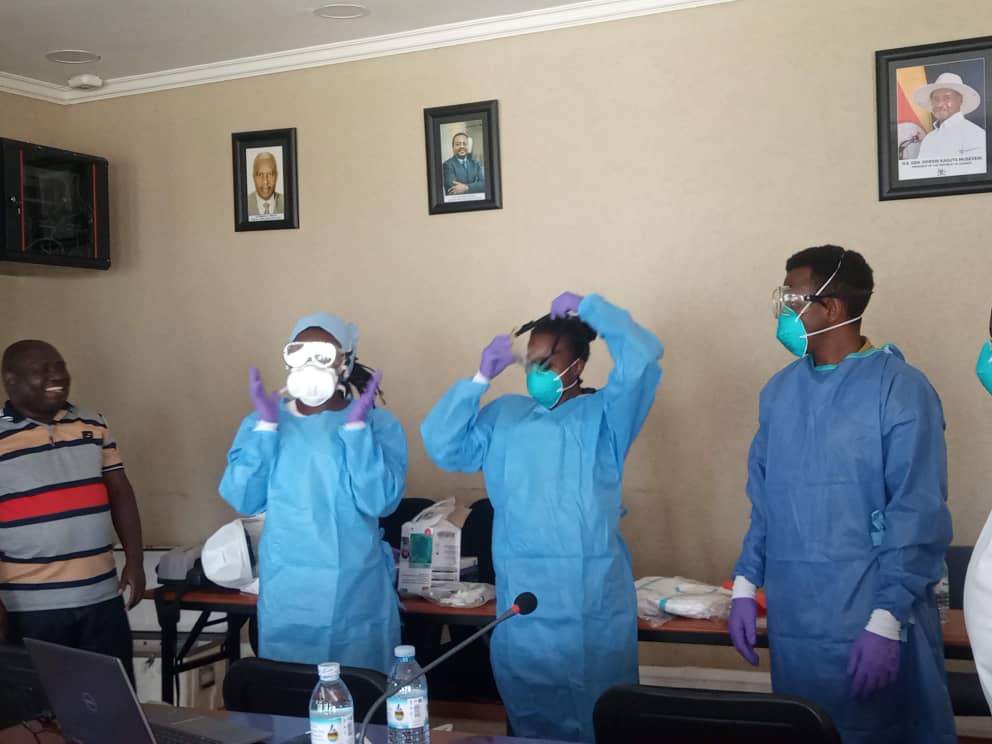Training, Mentorship & Expertise Provision
Training, mentorship, expertise provision and management systems implementation/evaluation for biosafety and biosecurity.

Technical Capacity
UNHLS possesses deep, context-specific expertise in the core competencies required for training, built upon years of national leadership in laboratory strengthening. Design and Delivery of Tailored Training: UNHLS led the development of Uganda’s National Harmonised Biosafety and Biosecurity Curriculum. We have extensive experience delivering this training nationwide. We propose to update and enhance this curriculum to fully align with ISO 35001:2019 and WHO LBM4, and to incorporate novel modules on cyber-biosecurity and biosecurity safeguards for AI in research, drawing directly from ongoing doctoral research within our department. Biorisk Assessment and Mitigation: Our team designed and executed the 2017 and 2018 National BRM Audits, providing us with unparalleled data on the Ugandan laboratory landscape and practical experience in risk assessment. This experience will be leveraged to train laboratories in conducting their own robust, context-specific risk assessments. Implementation of International Standards: We will establish a structured National Biorisk Management Mentorship Program. Using our tiered network, we will implement a “Training of Trainers” model where UNHLS experts train mentors at the regional level, who then provide hands-on, long-term support to district-level labs to help them progressively implement and conform with ISO 35001 principles. Auditor Competence: Key personnel on our team have undergone extensive training in laboratory auditing and will seek formal certification as ISO 35001 assessors to lead this program with the highest level of competence. Peer-Based Approaches (Twinning): Our mentorship program is a form of national “twinning,” where higher-tier national and regional labs provide peer support and guidance to lower-tier facilities, creating a sustainable and collaborative network of expertise. Applied Biosecurity Expertise and Emergency Response: UNHLS has frontline experience in providing rapid biosafety and biosecurity support during numerous outbreaks, including Ebola, Marburg, and COVID-19. We can rapidly deploy experts to provide on-site training and mentorship in emergencies, a critical capacity for supporting the 100 Days Mission. Design, Delivery, and Evaluation of Training: We have developed and implemented a national BRM curriculum that is now ANSI/ACET 2814-certified and utilised by the International Federation of Biosafety Associations (IFBA) for professional certification in Africa and Asia. This curriculum includes online-deployable mentorship guides, checklists, and lab simulation tools. Through a continental BRM Training-of-Trainers program, we have trained over 300 professionals in more than 20 countries using a blended learning model. Biorisk Assessment and Mitigation: Our office has conducted over 100 quantitative BRM audits in diverse settings, including clinical, research, and vaccine-handling laboratories supported by initiatives like the WHO BioHub and US CDC. We have direct experience leading biosafety evaluations for high-consequence pathogens, such as during Uganda’s 2022 Ebola (Sudan strain) outbreak, where we developed and validated diagnostics and inactivation protocols. Implementation of International Standards: We specialize in guiding laboratories toward conformity with recognized international standards. Our mentorship programs have supported institutions across East Africa in implementing BRM systems aligned with ISO 35001 and WHO guidance, including in specialized areas like vaccine cold chains and COVID-19 test manufacturing facilities. Our work also includes novel applications, such as developing AI-augmented risk dashboards for AMR surveillance programs. Emergency Response and 100 Days Mission Support: Our capacity and experience for rapid deployment is proven. During the 2022 Ebola outbreak, we provided rapid BRM surge support to 14 districts, establishing BRM-compliant VHF testing labs in under 72 hours, resulting in zero laboratory-acquired infections and earning a WHO commendation. We offer specialized training in sequencing biosafety, advanced decontamination, and safe sample sharing—all critical enablers for the 100 Days Mission.
Available Resources
Our association with UNHLS will leverage its significant existing resources to ensure the success and sustainability of this program. Our primary resource is our human capital: a core team of national BRM experts and the extensive network of laboratory Specialists across the country. Our infrastructure, including the National reference laboratories for training and regional workshops, will serve as centres for training activities.
A. Human Resources
We maintain an active, multidisciplinary network of biosafety and biosecurity professionals with diverse global certifications and experience. These include:
- 4 Africa CDC Regional Subject Matter Experts (SMEs) in Biorisk Management and Biological Waste Management
- 57 IFBA-certified biosafety professionals across human, animal, environmental, and agricultural sectors
- 40 BRM Auditors, as per ISO 19011, ISO 35001:2019 and ISO 15190:2020
- 35 BRM Trainers of Trainers (ToTs) using ANSI/ACET 2018-1-certified training materials
- 30 active BRM Mentors with recent deployments in outbreak and vaccine research contexts
- 12 Emergency Response Managers with GHSA deployment experience
- 64 SLIPTA Auditors and 20 SLMTA ToTs enabling integration of BSS in quality systems
Our technical staff also include Laboratory Specialists, Infectious Disease Specialists, Epidemiologists, Veterinarians, Public health experts, Infection preventionists, Clinical Microbiologists, and Environmental Scientists, making us truly One Health-capable.
B. Infrastructure & Facilities
- NHLDS Reference Laboratories: National TB Reference Laboratory (NTRL), Central Public Health Laboratories (CPHL) including HIV, Hepatitis B, Sickle cell disease, Malaria reference laboratory, Cancer/Pathology Reference laboratory Genomics Reference Laboratory
- National Microbiology Reference Laboratory (NMRL)
- Central Emergency Response & Surveillance Laboratory (CERSL)
- Mobile Laboratories (Type II (05), Type III (01), & Type IV(01)
- Equipped for training in PPE use, donning/doffing, waste management, and mock BSL-3 operations.
- eLearning Platform and Digital Resource Hub: Includes video modules, assessment tools, and multilingual learning content.
C. Specialized Equipment & Tools
Decontamination Equipment:
- Autoclaves, dry heat sterilizers, UV and hydrogen peroxide-based decontaminators.
- BSL-3 decontamination validation kits.
- Incinerators and high-grade waste containers for transport and field deployments.
BRM Audit and Assessment Tools:
- ISO 35001-aligned digital audit checklists.
- Real-time scoring dashboards and risk visualization tools.
Cold Chain Monitoring and Biospecimen Transport Kits:
- WHO PQS-approved vaccine carriers.
- Biosafety-compliant IATA shipping materials.
- Live tracking for high-risk sample logistics.
Partnerships & Collaborations
We leverage strategic collaborations with leading global and regional institutions, including:
- Africa CDC: Co-developers of the Regional Biosafety Certification Framework; lead trainers under the Eastern Africa Biosafety Initiative and HCATS Guidelines and assessment tool
- Membership: National Biosafety Committee
- Johns Hopkins Center for Health Security: (Sandra’s Contribution)
- West Africa Health Organisation: Waste Management & Risk Management curriculum dev’t and tool
- East Africa Community Laboratory Network
- WHO AFRO: Membership on steering Committee on Responsible Use of the Life Sciences and Dual-use Research (TWC-RULS-DURC)
- US CDC: Long-term partners in BRM, Risk assessments and sample referral network biosafety optimization.
- ASLM, IFBA, and GHSA Platforms: Facilitate knowledge exchange, twinning, and regional mentorship.
- National One Health Platform, the Ministry of Agriculture (MAAIF), the Ministry of Water and Environment (MWE), Makerere University, the School of Biosecurity, Biotechnical and Laboratory Sciences, and key international partners like the WHO, Africa CDC, and US CDC. These partnerships ensure our ability to work effectively in a multicultural, intersectoral environment and to mobilize resources rapidly, including for emergency call-offs, through established government and partner communication channels
Our presence in existing laboratory and emergency preparedness networks ensures we are fully integrated in national, regional, and global surveillance and BRM systems.
Similar Works
Location: Nationwide, Uganda.
Location: All regions of Uganda.
BT SMC Ltd, CONDUCTED A HIGH-RISK BIO-SAFETY AND BIO-SECURITY TRAINING FOR UGANDA VIRUS RESEARCH INSTITUTE (UVRI) INACTIVATED COVID-19 VACCINE DEVELOPMENT PROJECT STAFF AND CEPI STAFF
We developed a core team of consultants to conduct a High-Risk Bio-Security and Bio-Safety Safety Training for Bio-Research involving deadly pathogens for Laboratory and other auxiliary Staff, to improve awareness amongst key stakeholders. This was also intended to build capacity to manage Bio-Security and Bio-Safety for Bio-Research Laboratory and auxiliary Staff handling deadly pathogens at UVRI Inactivated Covid-19 vaccine development project and CEPI.
Over the years i.e from March 2021 to 2024: we conducted moderate to high risk Bio-Safety and Bio-Security training for inactivated Covid-19 vaccine development project staff for both Masaka and Entebbe sites’ Bio-Research Laboratory and auxiliary Staff handling deadly pathogens and for the UVRI In-Vitro studies project staff as well as Uganda Virus Research Institute (UVRI)- International AIDS Vaccine Initiative (IAVI) Staff together with Bio-Security and Bio-Safety Leadership Training in the COVID-19 era to UVRI Institutional Bio-Safety committee.
Areas covered in these trainings included: Leadership and Management in BRM, Current Emergencies ( M.POX), Risk Response and Management, Bio-Risk Pathogens and Risk Management, Bio-risk Mitigation and performance, Guidance for the Selection, Use and Prioritization of Personal Protective Equipment (PPE), Overview of Monkeypox Virus: Outbreak in Multiple countries and Public Health Concerns, Waste Management Practice and Spills, The 7 Habits Of Highly Effective People, Principles of Fire Prevention, Fighting and Rescue, First Aid In Laboratory Settings as well as Firefighting and rescue Demonstration, complete with pre- and post-training evaluations.
Example 2: National Biorisk Management Audits (2017-2018):
Activities: Developed a national checklist, trained auditors, and conducted on-site assessments of over 100 laboratories across the human and animal health sectors. Analysed data to produce a national performance report.
Funding Source: Ministry of Health / US CDC Cooperative Agreement.
Outcome/Sustainability: Established the first national baseline for BRM performance, which has directly informed national strategic planning and the development of this proposal.
Example 3: Roll-out of the National Harmonised Biosafety Curriculum (Ongoing):
Activities: Developed a standardised curriculum, conducted Training of Trainers (ToT) workshops for 50+ mentors from Regional Referral Hospitals, and supported the subsequent cascade training of over 500 laboratory professionals.
Funding Source: Global Health Security Agenda (GHSA) funds.
Outcome/Sustainability: Created a sustainable national capacity for standardized biosafety training, with a permanent pool of regional mentors.
Relevant Technical Experience
A. Training, Curriculum Development, and eLearning
ANSI/ACET 2814-certified Biorisk Curriculum, used by IFBA for candidate certification in Africa and Asia. It includes online deployable mentorship guides, checklists, and lab simulation tools.
Supported continental BRM ToT program, training over 300 professionals in 20+ countries using a blended learning model.
Jointly developed with Johns Hopkins and WHO-AFRO the COVID-19 molecular diagnostics biosafety training package deployed across 8 countries during the pandemic.
Developed Uganda’s National One Health BRM Curriculum, inclusive of vaccine R&D settings, BSL-3/4 simulations, pathogen inactivation, and sample transport for VHF pathogens.
B. BRM Audits and Risk Assessments
Conducted >100 quantitative BRM audits in clinical, research, and vaccine handling labs, including those supported by WHO BioHub and CEPI/US CDC initiatives.
Conducted facility assessments aligned to ISO 35001 and WHO guidance, including risk-benefit assessments for AI tools in pathogen diagnostics (pilot: Uganda AI-Pathogen platform 2024).
Led biosafety evaluations of EVD (Sudan strain) diagnostics and inactivation processes during Uganda’s 2022 outbreak.
Developed waste risk mitigation protocols and AI-augmented risk dashboards for AMR surveillance programs in Uganda, Kenya, and Jordan.
C. Twinning and Mentorship
Supported peer exchange twinning between Uganda and Nigeria for COVID-19 genomic BRM in 2021-2022.
Mentored institutional biosafety officers in 5 East African countries under a WHO/US CDC ECHO
BRM platform, including certification support for BRM professionals.
30+ active BRM mentors deployed to public and private sector labs, supporting transition to BRM-aligned systems in vaccine cold chains, storage hubs, and COVID-19 test manufacturers.
D. Emergency Response and 100 Days Mission Support
Provided rapid BRM surge support to 14 districts during the 2022 Ebola outbreak, enabling BRM compliance in VHF testing labs in <72 hours.
Developed SOPs and response toolkits used in WHO BioHub deployments for Ebola, Marburg, and Nipah virus diagnostics.
Offered training in sequencing biosafety, decontamination techniques, AI-assisted pathogen classification, and safe sample sharing aligned with the 100 Days Mission goals.
Ready to Get Started?
Whether you need a new website, want to improve your online visibility, or looking for a comprehensive digital solution, we’re here to help. Contact us today for a free consultation.
